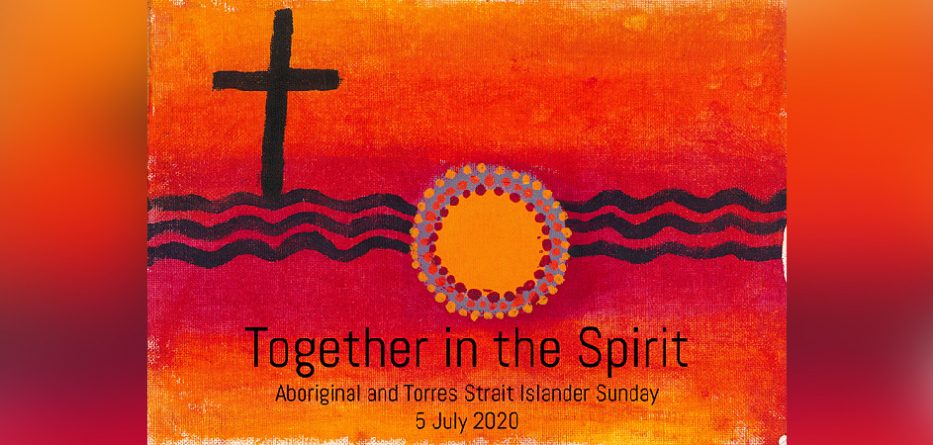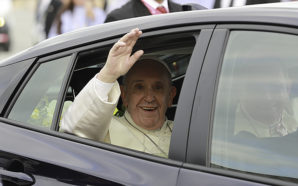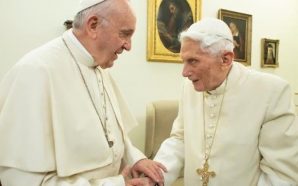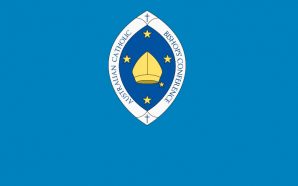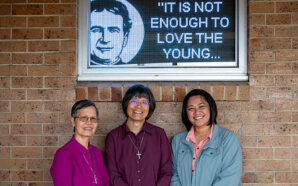Homily for the Fourteenth Sunday in Ordinary Time Year A 2020
Readings: Zechariah 9: 9-10; Psalms 145: 1-2, 8-9, 10-11, 13-14; Romans 8: 9, 11-13; Matthew 11: 25-30
5 July 2020
Today we celebrate Aboriginal and Torres Strait Islander Sunday with the theme ‘Together in the Spirit’. On this day 250 years ago, 5 July 1770, Captain Cook’s Endeavour was stranded undergoing repairs in what he then named the Endeavour River. Tupia the Tahitian navigator and the English botanist Joseph Banks went ashore looking at botanical specimens. Tupia was happy to try out using a gun, hunting for wildlife. According to Banks’ journal, they encountered two natives ‘digging in the ground for some kind of roots; on seeing him they ran away with great precipitation’. The popular writer Peter Fitzsimons describes the ‘two natives peacefully collecting bush tucker as Tupiastands about them, gun brandished’. Tupia went on hunting, firing many shots at wildlife. What must the local GuuguYimithirr people have thought? This was their first encounter with foreign cultures – English and Tahitian. This was their first sighting and sounding of a gun. What sort of beginning was this for coming ‘Together in the Spirit’ – the theme of our Aboriginal and Torres Strait Islander Sunday exactly 250 years later? How often was this initial encounter repeated time and again on the frontiers of colonial and pastoral expansion?
Most of us have descendants who arrived in this land over the past 250 years. Some of us have descendants who were here tens of thousands of years before Cook, Banks and Tupiaarrived. All of us have some responsibility for recognising and protecting the heritage of those descended from the Aboriginal people who have lived here for tens of thousands of years. Those whose descendants date back thousands of years in this land ought enjoy a special place in the nation’s life, maintaining that heritage, handing it on to future generations. They are the primary custodians of the nation’s unique patrimony.
LISTEN: https://soundcloud.com/frank-brennan-6/aboriginal-sunday
Today we hear those consoling words of Jesus, ‘Come to me all you who labour and are overburdened, and I will give you rest.’ The recent destruction of the Juukan Gorge rock shelters with sites of significance dating back 46,000 years reminds us that we have not yet got things right, hearing and respecting those who speak for country.
We gather ‘Together in the Spirit’ during the COVID-19 Pandemic and in the wake of riots and protests in the USA following upon George Floyd’s death under the knee of a white police officer. Here in Australia we have joined the chorus that ‘Black Lives Matter’, drawing attention yet again to the appalling statistics of Aboriginal deaths in custody. These protests remind us that for the original Australians, life is still precarious and marginal for so many who should be secure and central to our national identity.
St Paul in his Letter to the Romans reminds us that our interests ‘are not in the unspiritual, but in the spiritual, since the Spirit of God has made his home’ in us. In the Uluru Statement from the Heart, Indigenous representatives told us three years ago that their ‘sovereignty is a spiritual notion: the ancestral tie between the land, or “mother nature”, and the Aboriginal and Torres Strait Islander peoples who were born therefrom, remain attached thereto, and must one day return thither to be united with our ancestors. This link is the basis of the ownership of the soil, or better, of sovereignty.’
Let’s hope that the 2017 Uluru Statement from the Heart can help to change hearts, providing a more secure place for Aboriginal and Torres Strait Islander peoples in the life of the Australian nation. At this Eucharist, we gather in the hope expressed by the prophet Zechariah in today’s first reading when the Lord says: ‘He will proclaim peace for the nations. His empire shall stretch from sea to sea, from the River to the ends of the earth.’
Despite the chaos and uncertainty of these days, we Catholics can gather, uplifted by the message of the Amazon Synod, and hoping for better times in our Church with the coming of the 2021 Plenary Council. After the Amazon Synod which focused so much on the plight and aspirations of indigenous peoples, Pope Francis spoke of the strong sense of community for the original peoples who have ‘no room for the notion of an individual detached from the community or from the land’. He spoke of their relationships ‘steeped in the surrounding nature, which they feel and think of as a reality that integrates society and culture, and a prolongation of their bodies, personal, familial and communal’. He said, ‘All this makes even more unsettling the sense of bewilderment and uprootedness felt by those indigenous people who feel forced to migrate to the cities, as they attempt to preserve their dignity amid more individualistic urban habitats and a hostile environment.’
The Pope asked, ‘How do we heal all these hurts, how do we bring serenity and meaning to these uprooted lives?’Archbishop Mark Coleridge, President of the Australian Catholic Bishops Conference, took up the Pope’s question and applied it directly to Australia. He said: ‘Pope Francis’ focus on indigenous cultures in the Amazon speaks strongly to the Australian context.’ ‘It’s good that the Pope’s words on indigenous peoples come as we in this country consider the woeful lack of progress on closing the gap between Indigenous and non-Indigenous Australians in key areas.’‘The issues faced by many in the Amazon are not foreign to Australia, and the Holy Father’s words come as a challenge and encouragement to us too.’
The focus for us as church is now on the forthcoming Plenary Council. The Plenary Council Discernment and Writing Groups have recently issued their series of six Discernment Papers. The group asking how we might be more missionary and evangelising have said: ‘Nationally, we must forge deeper relationships with Aboriginal and Torres Strait Islander peoples, oppose any prejudice, and actively work for reconciliation.’ In today’s gospel, Jesus blesses his Father ‘for hiding these things from the learned and the clever and revealing them to mere children.’ This discernment group has laid down the challenge: ‘The Church in Australia must be shaped by Aboriginal and Torres Strait Islander culture and spirituality for it to be authentically a Church of this land. When the Church sinks its roots deep into Aboriginal and Torres Strait Islander culture, it will authentically be a Church in the land with a new vision and energy for mission.’
Another group discerning how our Church might be more humble, healing and merciful have spoken of our Church in Trauma. They have insisted on the need for us all to start at the beginning of the trauma in this land. ‘The first roots of our contemporary country Australia were founded in trauma. The double trauma of a penal colony of confinement and punishment meeting the subsequent subjugation of our First Nations peoples has been written into our identity as a nation. Aboriginal and Torres Strait Islander Australians are one of the most traumatised and disenfranchised peoples of the world. Our Church was present from these earliest times, and therefore carries these disturbing storylines in its history and identity.’ These insights find deep resonance in the Uluru Statement from the Heart: ‘Proportionally, we are the most incarcerated people on the planet. We are not an innately criminal people. Our children are aliened from their families at unprecedented rates. This cannot be because we have no love for them. And our youth languish in detention in obscene numbers. They should be our hope for the future.’
We remember Pope John Paul II’s address at Alice Springs in 1986 when he told us: ‘You are part of Australia and Australia is part of you. And the Church herself in Australia will not be fully the Church that Jesus wants her to be until you have made your contribution to her life and until that contribution has been joyfully received by others.’
It’s heartening to hear one of the discernment groups preparing for the Plenary Council saying, ‘The Uluru Statement from the Heart continues to echo these sentiments and a deep cry for healing. Humble listening will bring healing for the Aboriginal and Torres Strait Islander peoples. The principle of subsidiarity is key – the days of others deciding for them must be over. A new and real engagement, standing together in solidarity, is a merciful and humble way to a new pathway of healing.’
At this Eucharist, we come seeking the consolation of the Lord’s presence as we hear Jesus declare to us: ‘Shoulder my yoke and learn from me, for I am gentle and humble in heart, and you will find rest for your souls. Yes, my yoke is easy and my burden light.’ We are blessed to be together in the Spirit. While most of us can claim ancestors like Cook, Banks and Tupia, some of us can claim ancestors like the local Guugu Yimithirr people who were terrified by the impostors on their country on this day 250 years ago. Together in the Spirit, we can ensure that places like JuukanGorge and the custodians are secure, at peace, and thriving in this land.
Fr Frank Brennan SJ is the Rector of Newman College, Melbourne and the former CEO of Catholic Social Services Australia (CSSA).




